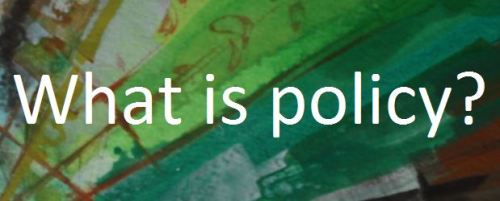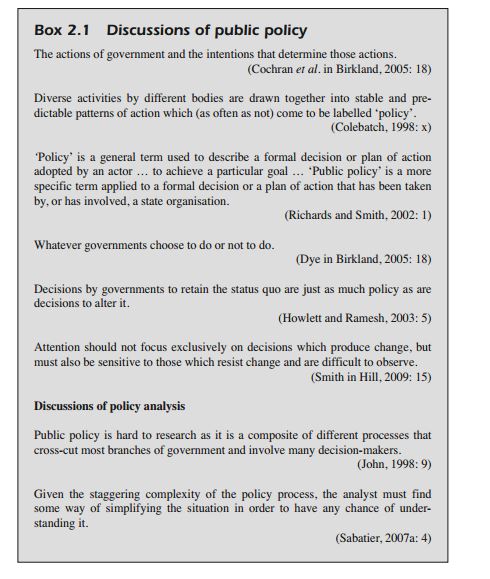Compare with What is the Policy Process? and What is public policy and why does it matter?
The first thing we do when studying public policy is to try to define it – as, for example, the sum total of government action, from signals of intent to the final outcomes. This sort of definition produces more questions:
- Does ‘government action’ include what policymakers say they will do as well as what they actually do? An unfulfilled promise may not always seem like policy.
- Does it include the effects of a decision as well as the decision itself? A policy outcome may not resemble the initial policy aims.
- What is ‘the government’ and does it include elected and unelected policymakers? Many individuals, groups and organisations influence policy and help carry it out.
- Does public policy include what policymakers do not do. Policy is about power, which is often exercised to keep important issues off the public, media and government agenda.
The second thing we do is point to the vast scale of government, which is too big to be understood without some simplifying concepts and theories. It is also too big to be managed. We soon learn that the vast majority of policymaking takes place in the absence of meaningful public attention. The ‘public’ simply does not have the time to pay attention to government. Even when it pays attention to some issues, the debate is simplified and does not give a good account of the complicated nature of policy problems.
We also learn that government is too big to be managed by elected policymakers. Instead, they divide government into manageable units and devolve almost all decisions to bureaucrats and organisations (including ‘street level’). They are responsible for government, but they simply do not have the time to pay attention to anything but a tiny proportion.
So, a big part of public policy is about what happens when neither the public nor elected policymakers have the ability to pay attention to what goes on in their name. That’s what makes it seem so messed up and so interesting at the same time.
It’s also what makes policy studies look so weird. We often reject a focus on high-profile elected policymakers, because we know that the action takes place elsewhere. We often focus on the day-to-day practices of organisations far removed from the ‘top’ or the ‘centre’. We ‘zoom in’ and ‘zoom out’ to gain several perspectives on the same thing. We spend a lot of time gnashing our teeth about how you can identify and measure policy change (still, no-one has cracked this one) and compare it with the past and the experience of other countries. We try to come up with ways to demonstrate that inaction is often more significant than action. When you ask us a question, your eyes will glaze over while we try to explain, ‘well, that’s really 12 questions’. We come up with wacky names to describe policymaking and bristle if you call it ‘jargon’. It’s because policymaking is complicated and it takes skill, and some useful concepts, to make it look simple.
To read more, see: Policy Concepts in 1000 words
(to store the podcast, right click and save this link)










Pingback: 12 things to know about studying public policy | Paul Cairney: Politics & Public Policy
Pingback: Policy in 500 Words: what is public policy and why does it matter? | Paul Cairney: Politics & Public Policy
Pingback: Policymaking in the UK: do you really know who is in charge and who to blame? #POLU9UK | Paul Cairney: Politics & Public Policy
Pingback: The theory and practice of evidence-based policy transfer: can we learn how to reduce territorial inequalities? | Paul Cairney: Politics & Public Policy
Pingback: Writing an essay on politics, policymaking, and policy change | Paul Cairney: Politics & Public Policy
Pingback: Writing for Impact: what you need to know, and 5 ways to know it | Paul Cairney: Politics & Public Policy
Reblogged this on Beginning to End Hunger: AgroEcoPeople and commented:
Great observations breaking down the challenges & reality of policy & policy studies by the always-insightful Paul Cairney.
Pingback: 5 images of the policy process | Paul Cairney: Politics & Public Policy
Pingback: Policy Concepts in 500 Words: The Policy Process | Paul Cairney: Politics & Public Policy
Pingback: Policy Concepts in 1000 Words: The Policy Process | Paul Cairney: Politics & Public Policy
Pingback: The impact of multi-level policymaking on the UK energy system | Paul Cairney: Politics & Public Policy
Pingback: Managing expectations about the use of evidence in policy | Paul Cairney: Politics & Public Policy
Pingback: Policy Concept in 1000 Words: Multi-centric Policymaking | Paul Cairney: Politics & Public Policy
Pingback: Policy Analysis in 750 words: Deborah Stone (2012) Policy Paradox | Paul Cairney: Politics & Public Policy
Pingback: My PhD – Heather Mitchell
Pingback: Policy Concepts in 1000 Words: Policy Change | Paul Cairney: Politics & Public Policy
Pingback: Policy Analysis in 750 Words: How to deal with ambiguity | Paul Cairney: Politics & Public Policy
Pingback: Making Social Policy - Assignment Freelancers
Pingback: Policy Concepts in 1000 Words: Contradictions in policy and policymaking | Paul Cairney: Politics & Public Policy
Pingback: Chapter 2. Perspectives on Policy and Policymaking | Paul Cairney: Politics & Public Policy